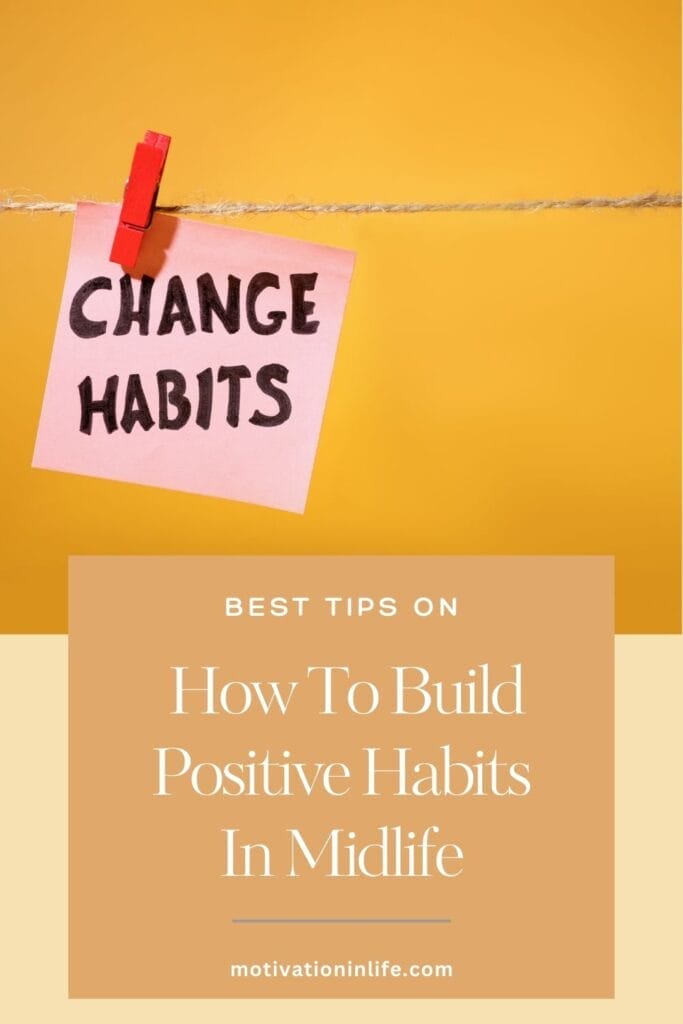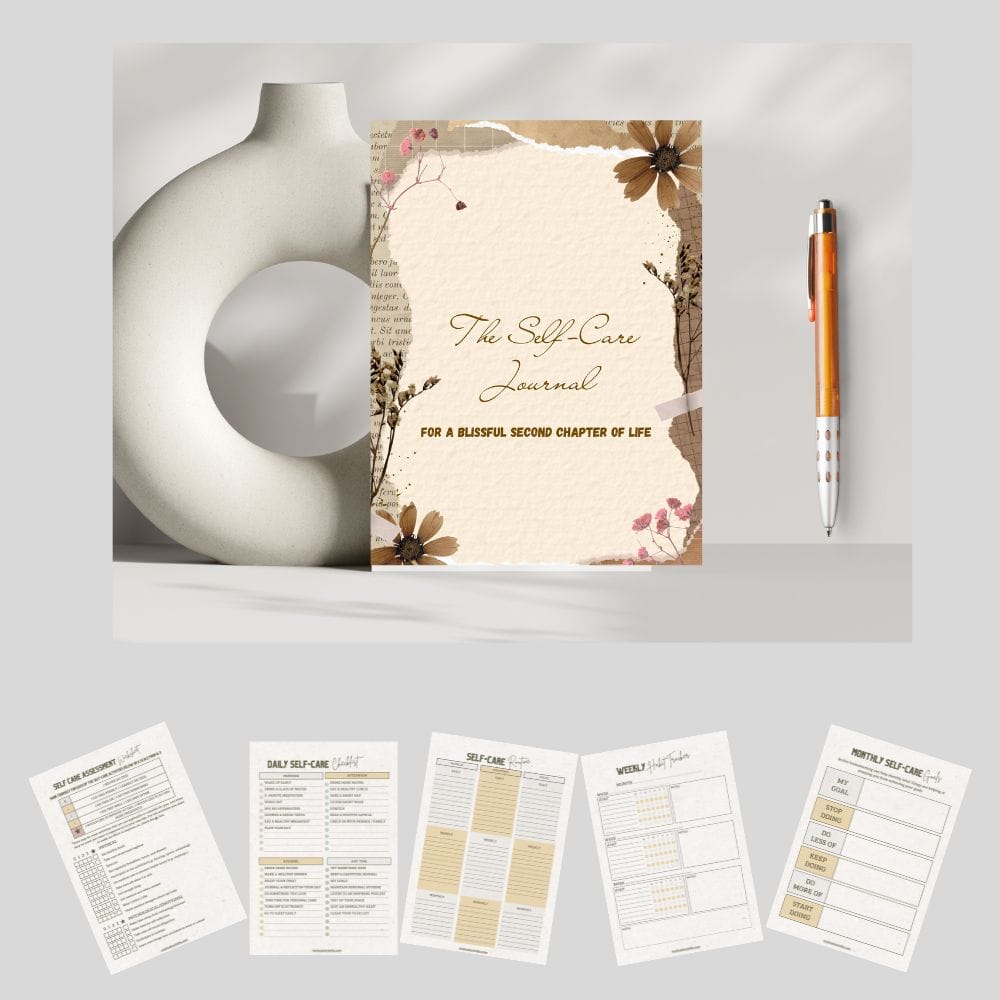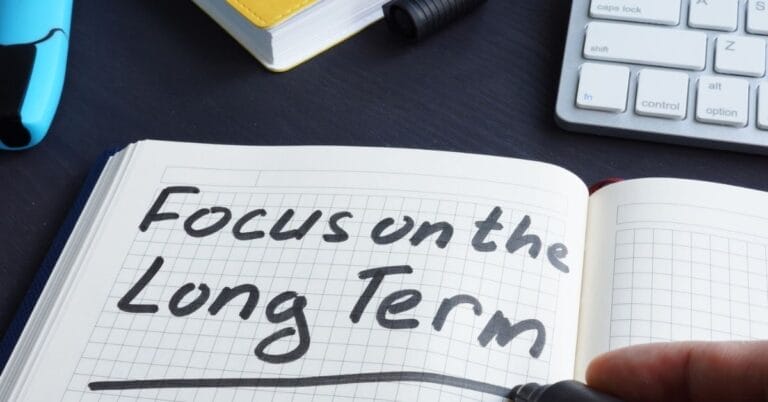How To build positive habits for better life (for the 40+)
“A nail is driven out by another nail; habit is overcome by habit.”
Erasmus
Are you looking for ways to build new habits or change a few existing ones but don’t know how? You have our back.
In this guide, you will learn about the best ways to develop positive habits in daily life and break bad ones, especially with age. You also learn about the different types of habits that exist and what causes them.
Finally, you learn some actionable tips on forming an ultimate list of good habits that will come to your rescue for the next phase of your life and keep them going strong!
Table of Contents
AFFILIATE DISCLOSURE
This post may contain affiliate links. We may earn a small affiliate commission at no extra cost if you click on them.
motivationinlife.com is also a participant in the Amazon Services LLC Associates Program, an affiliate advertising program designed to provide a means for sites to earn advertising fees by advertising and linking to Amazon.com and Amazon.in
We may earn a small commission for our endorsement, recommendation, testimonial, and/or link to any products or services from this website.
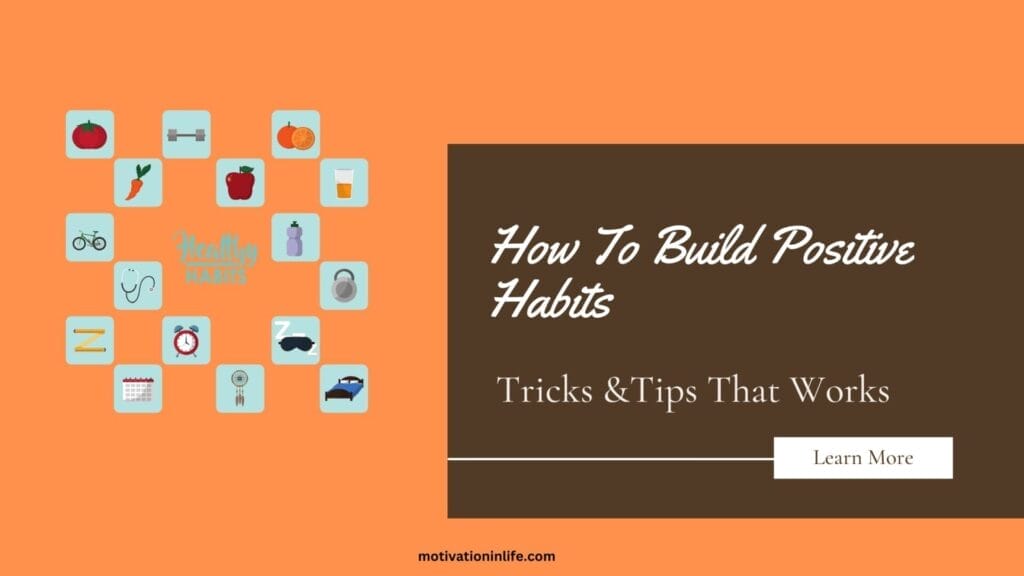
What Are Positive Habits?
Simply put positive habits are those habits that help improve the quality of your life. They are those good habits that you have developed over the years which are now the backbone of your life.
Everyone has their way of living, and there is no one right way to live. However, a list of positive habits accompanied by some positive affirmations can make your life a lot easier.
At times you feel unsure of what you should do to improve your life, yet a few things can be done daily to improve the quality of your life. Some essential good habits to have include
- eating healthy food,
- getting exercise, and
- spending quality time with loved ones.
These are all great ways to become happier and healthier and boost your personal growth. It is important to find what works for you and to stick to it, as these positive lifestyle habits will create meaningful change in your life.
Taking care of yourself in your midlife is one of the best habits you can develop. It will not only help you to prioritize yourself but also bring positivity to your life.
We have designed a Self-Care journal for you using templates at Creative Fabrica. You can Download the Self-Care journal and start building positive habits today!!
How Do Habits Form?
If you want to change your habits and build a list of positive habits for a happy life, you need to first understand how habits work and form.
Here are three things to keep in mind to understand this:
- Habits are unconscious—you don’t realize you’re doing them until they’re done.
- Habits are triggered by cues – things that remind you to do the habit.
- Habits are automatic -they tend to happen without thinking once they’re formed.
So, you form a habit when you do the same thing repeatedly without thinking about it. This can be something as simple as brushing your teeth every morning or as complicated as playing the piano for hours.
Some habits are good for your health, while others can lead to problems. Habits can be changed through practice and thought, but it can also be hard to break them once they’ve been formed.
Habits can be altered through willpower, but they are often easier to change if they are changed gradually. There are different ways to form habits, and the best way to change a habit is to find what works for you and stick to it.
A habit tracker is a great tool to stay on track with your habit formation. You can get yourself a habit journal/tracker so that you can keep a record of your journey.

How To Change Habits And Build Positive Habits In Your 40s And Beyond?
When it comes to developing excellent, positive personal habits, the environment you create for yourself may make or break your success.
If you want to increase your chances of success, keep your surroundings clean and clear. When your surroundings are at their best, it will benefit your productivity.
Keep Your Surroundings Clutter-Free
Nothing is more frustrating than focusing on positive habit-building while being bombarded by a mountain of clutter.
If you want to increase your productive time, for example, it won’t help if you have to spend most of your day hunting for your belongings. You are negatively affected psychologically by clutter. It constricts your space.
It is not only physical clutter that is an issue. Virtual clutter may be just as annoying. Spending a lot of time sorting through emails or searching your disc for things you saved weeks ago is just as time-consuming as combing through papers on your desk.
Phone clutter is also a common phenomenon these days, and it occurs when you spend too much time on the phone and, consequently, too much data gets stored on your phone and you have no control over the same.
Clutter control is greatly aided by proper organization skills. Create a strong system for both physical and virtual assets.
There are several books like Habit Stacking by S J Scott and courses on platforms like Udemy available to assist you in solving your clutter problem.
Decluttering is unquestionably one of the positive habits to cultivate that will significantly help you streamline your life.
You can also read our post on the best ways to organize your life and how to start decluttering when overwhelmed to understand the importance of being organized in life.
Getting rid of clutter in your daily life should be the first step in your quest to establish positive daily habits.
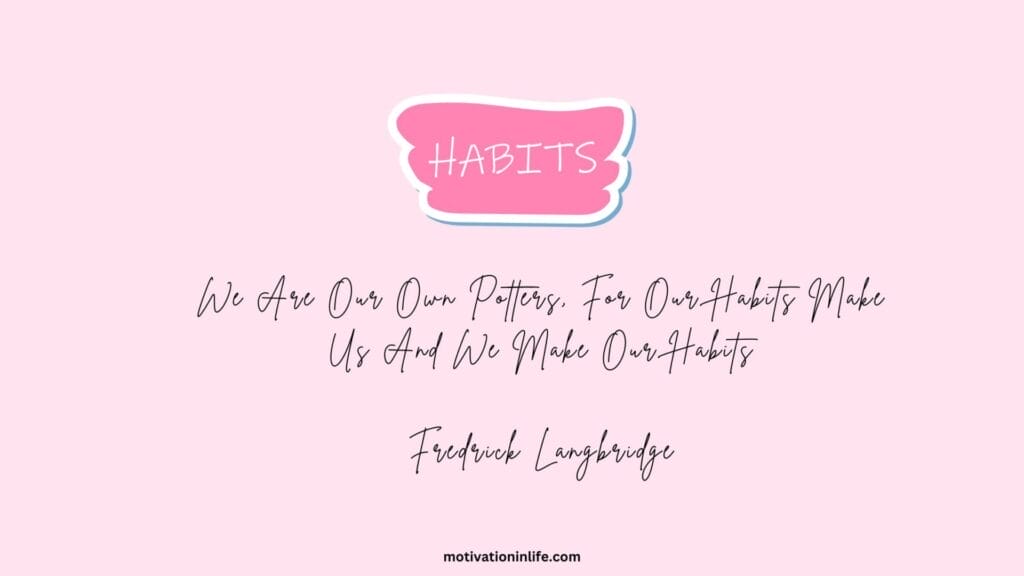
Develop Positive Habits Of Mind for Midlife
Another crucial part of your surroundings is your mental state and mental health. When stressed, your capacity to build good habits toward positive behavior is hindered.
You concentrate on what’s bothering you. That then becomes your primary concern.
In such a situation, making any progress with your habit development is impossible. Yet you need to take the necessary steps to lessen stress.
There are various methods for reducing stress. The first thing is to take action to resolve any problems over which you have control that is causing you stress. For example, if your expenses are piling up, consider doing some additional work that will help you earn extra income.
Consider spending time exercising and meditating to relieve stress caused by factors beyond your control. Even though you may still have stressful situations, you will be able to handle them better.
Both of these practices have been shown to help your mind and body recover from the impacts of stress.

Develop The Growth Mindset Habit And get Over your Limiting beliefs
It’s simple to look at everything you shouldn’t do when determining what new habits you want to pursue. Maybe, you wish to quit smoking or stop overeating. Or, you want to learn how to say ‘no,’ or spend less time on social media.
Yet, have you ever considered the inverse of all of that by developing a good habit? What about when the habit you want to build is one of personal development and growth?
Your life will be better in many ways if you have a growth mindset, which makes it one of the most important habits to develop. What are the advantages of developing a growth mindset?
- You keep learning new skills
- You learn perseverance
- You learn how to embrace challenges
- You learn how to embrace failure
- You become more open to criticism
Are your limiting beliefs keeping you from making progress? Please read our blog post Truth About What Are Limiting Beliefs And How To Identify Them (For The 40+)
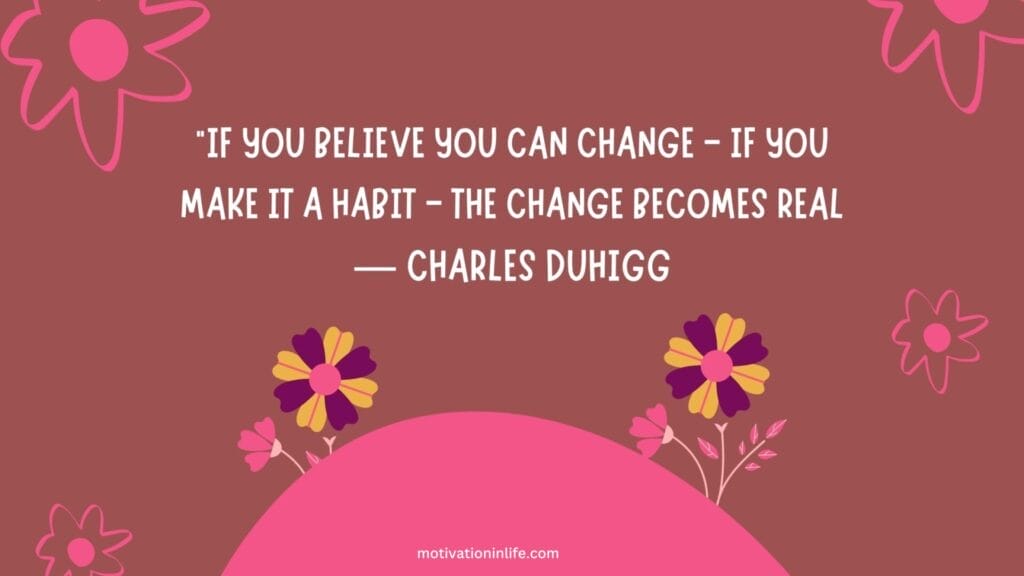
Habits And Routines
Are habits and routines interchangeable? Or is there a difference between the two.?
People often confuse habits with routines. But while they share some common features, they are actually quite different.
Habits are automatic, and habitual behaviors are those you do without thinking. They come to you easily and tend to be consistent.
Routines, on the other hand, are specifically designed activities that you do regularly to improve your efficiency or productivity. They may be new or familiar, but they always involve a specific set of steps you follow in a specific order.
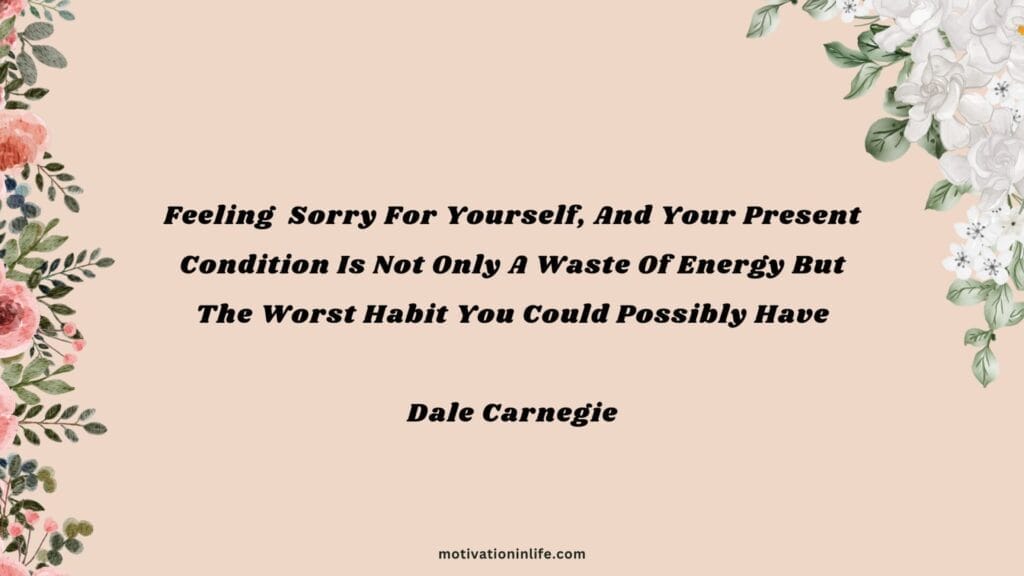
How Daily Routines Can Help You Reach Your Goals
Daily routines are the key to success. But they are not always easy to maintain. They require a lot of dedication and discipline.
There is no one-size-fits-all routine that will work for everyone. It all depends on your goals and what you want to achieve in life.
If you want to ascertain what your goals in life are and how you can set them properly to achieve your goals, you can read our blog post on setting simple life goals.
The best way to start is by identifying the most important activities you want to focus on each day. Once you’ve compiled your list, it’s time to figure out when you should do each item for it to have the most significant impact on your day.
For example, if your goal is to get more exercise, then it would make sense for this activity to happen first thing in the morning before anything else distracts you or takes up your time.
It’s important to set specific moments for each goal from your positive habits list, as you have a finite amount of time (or energy) daily, and it’s better to make sure that your most essential goals happen when you have the most time and energy.
Please read our blog post Why Your Routine Matters For Changing Life Habits (For The 40+) to understand the importance of routines in life.
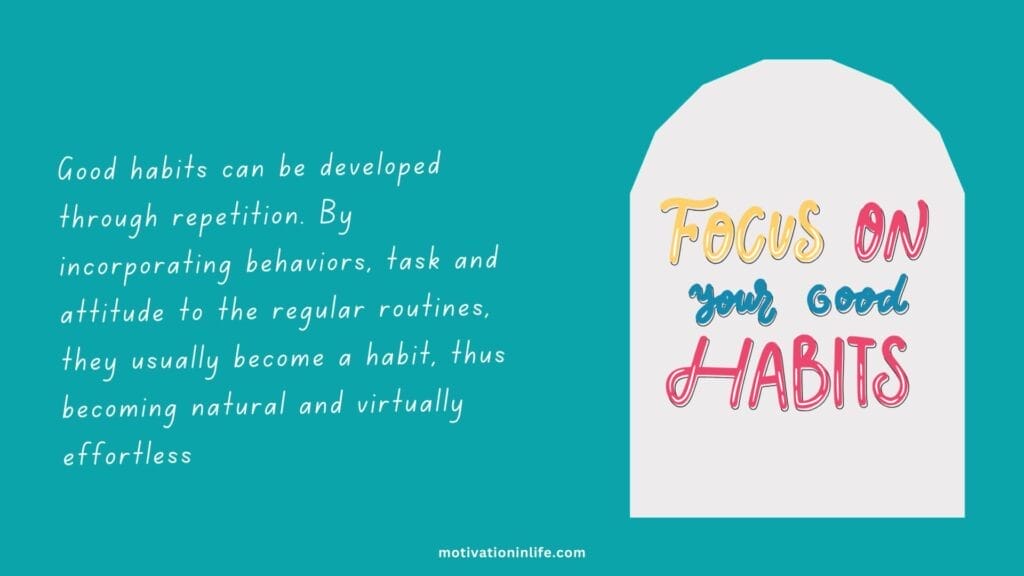
How To Easily Make Exercising Daily A Habit in Life after 40
You have always been told to be active, but how many of you have struggled to make exercise a regular habit?
It is a known fact that you strengthen your body by exercising throughout the week, which keeps your energy levels high, and makes you more productive. But exercising is also beneficial in other ways.
Exercising improves your sleep and keeps you healthy overall as you age. Exercising not only keeps your body in shape and helps you lose weight but also improves your mood and general mental wellness.
Set time aside in your schedule
Exercise is important for overall health. Yet sometimes it can be difficult to fit it into your busy schedules. Make time for exercise in your schedule by setting a time every day.
Dedicate some time for workouts or yoga or whatever you choose to do. That way, you’ll be more likely to stick with it and see the benefits.
Use your smartphone or a fitness tracker
Set a reminder on your phone or get yourself a fitness tracker. This way, you do not miss or skip the time you have fixed to do some exercise. Smartphones are great tools for staying healthy and fit.
You can also track your daily fitness goals with the help of your fitness tracker. If you want to be more active, set a plan for how many miles you want to walk or run each day.
Prepare yourself beforehand
Layout your workout clothing and equipment the evening before so you don’t have to use the excuse of not having time to find anything. You can keep your workout bag close to the door and be set to go.
Just leave when ready
Do not procrastinate. As soon as it is time to go and exercise, leave. Do not overthink. Slowly, that will become a part of your routine.
Take baby steps
By starting gradually, you won’t overload yourself or, worse, injure a body that isn’t ready for a strenuous workout. You can always extend your hours as you get stronger.
Keep it interesting
Nothing screams monotony like repeating a routine over and over again. Vary your routine by running a new route or attempting a new workout machine at the gym.
Adding new forms of exercise ensures that you are training your entire body.
It’s OK to Take Breaks
You don’t want to miss any days while establishing your new healthy habit. Consistency is crucial.
However, it is beneficial to take it slow once in a while, especially when your body calls for it or if you are extremely exhausted or unwell.
Once you make exercise a daily habit, you’ll look forward to it. You won’t even think about it; you’ll just do it. With so many benefits, it’s clear that exercising every day is a must if you want to be happier and healthier.
Treat this as an example. You can apply this strategy to any habit that you want to form. All you need to adopt is a way to implement the habit that you want to inculcate.
Please read our blog post Time Management Strategies: Eliminate Distractions and Make Your Downtime Productive (For The 40+) to how to effectively manage your downtimes.

How To Form Habits In Midlife That Last
It can be hard to form new habits especially as you age. Yet with a little bit of effort and some guidance, you can create a routine that will help you reach your goals.
Here are five tips for forming healthy habits that stick
- Make a list of what you want to accomplish.
- Set small goals that you can achieve easily.
- Make sure the habit you’re trying to develop is beneficial to your overall well-being.
- Create a routine. When you have a habit that you want to establish, make sure it follows a regular pattern. This will make it easier to stick with.
- Find an incentive to look forward to. For eg reduce a kilo weight in a month.
At times the only reason you fail to form habits that you want to develop is your lack of motivation. If you feel your motivation has dipped as you have entered your 40s and beyond, please read our blog post 15 Proven Tactics Of How To Get Motivation Back In Life (For The 40+)
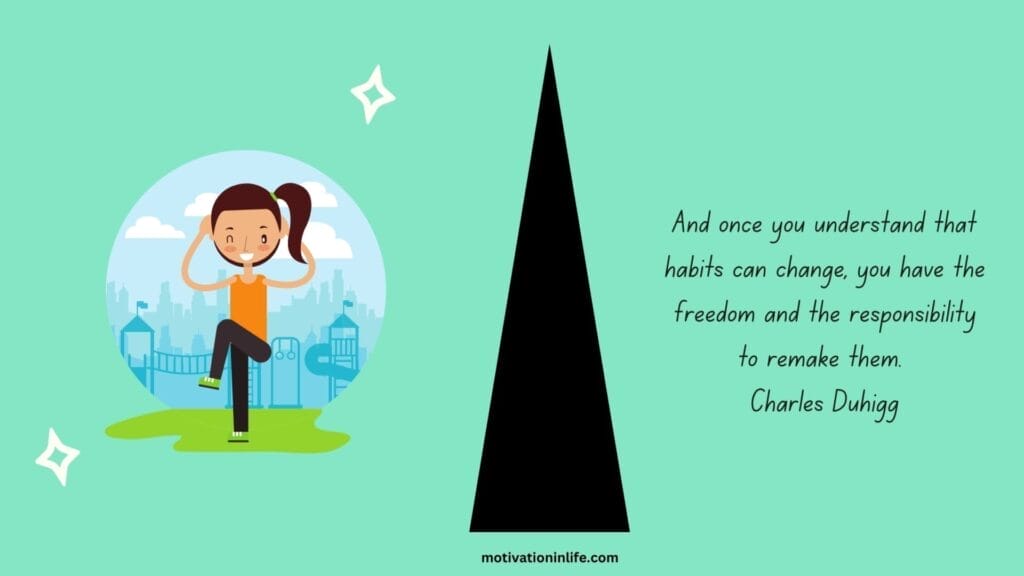
How To Achieve Your Habit Goals More Easily in Life After 40?
You’ve set a goal for yourself. You’re finally going to break that bad habit or all of the bad habits you’ve marked on your bad habit list.
You’ve seen it before. You’ve been discussing doing something for a long time, and are relieved that you finally have a deadline. You feel you have got this covered.
But is it so?
It’s long been assumed that making a good decision to change is half the battle won, whether you’re trying to break an old habit or form a new one.
However, these idealistic plans often do not materialize. Do you know why?
The difficulty with goal-setting is that if it is not done correctly, you focus on the wrong thing or goal. You make resolutions like losing 25 pounds by swimsuit season or quitting smoking by Christmas.
But, even if you have a fair timeframe in place, nothing will happen until you have a strategy in place to make it happen.
So make a concrete plan, prepare your habits examples list, and chart out a roadmap to get there. If you find it difficult to be focused on your goals please read our blog post Staying Focused On Your Goals For A Simplistic & Productive Life (For The 40+)
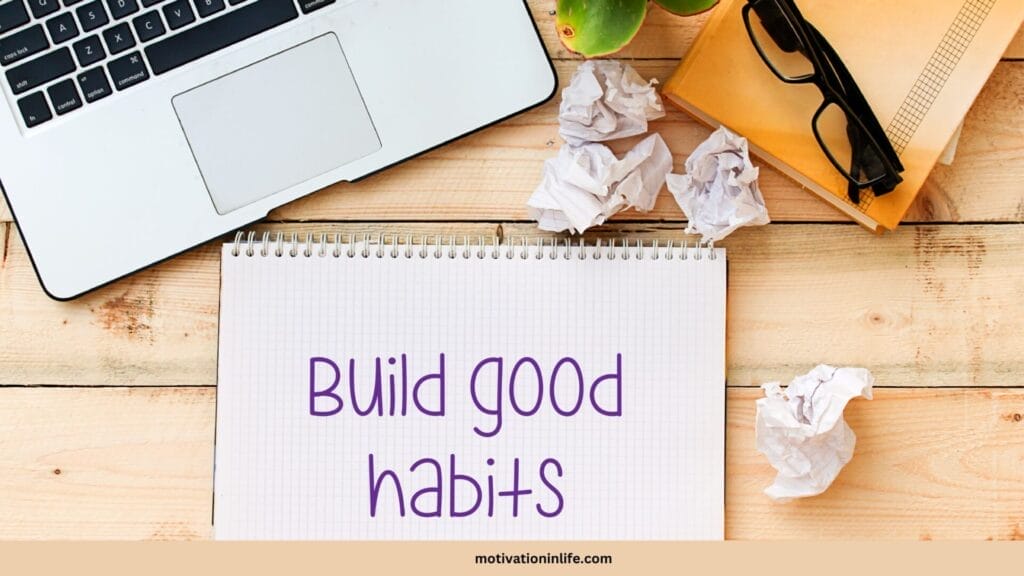
Tips That Will Help You To Build Positive Habits Easily
Divide the work into manageable goals
How are you going to drop those 25 pounds if that is what you want to do? Perhaps you’d like to exercise more and keep a closer eye on your nutrition.
Instead, set a target for each week. To achieve this goal, for instance, you may want to swap breakfast for a protein drink daily and head to the gym 2 – 3 times weekly
So ideally, you must identify the steps necessary to achieve the specific goal.
Mark those tasks on your calendar
How are you going to put the parts together now that you know what they are?
So, if you want to go to the gym three times per week, schedule it in your calendar. Similarly, if you’re going to change your eating habits, prepare a food plan. Hang it at someplace where you’ll notice it.
If your schedule is all haywire and you have no clue of how to manage your calendar and your life I highly recommend you take the second brain challenge course by friend Lindsay Kelly.
She teaches you how to streamline your calendar and your schedule using Google Sheets. For only ten dollars you get amazing information and knowledge.
Keep track of your progress
As change is slow, having a visual signal will help you recognize that you are, in fact, making progress toward your goals.
Remember those medal boards you used to have as kids? They work on adults too. Alternatively, make a note on your calendar so you can know at a glance when you’re making progress.
Don’t be concerned about the deadline
Perhaps things aren’t moving as quickly as you’d like. Do not worry if you set a target to lose 2 pounds weight by the end of the month, but you have been able to only shed a pound.
Simply the fact that you’re making headway indicates that you’re on the correct track. Continue!
With time and effort, you can change your habits. In this situation, the journey is more important than the goal. Make a sound strategy, and you’ll achieve whatever your objective is!
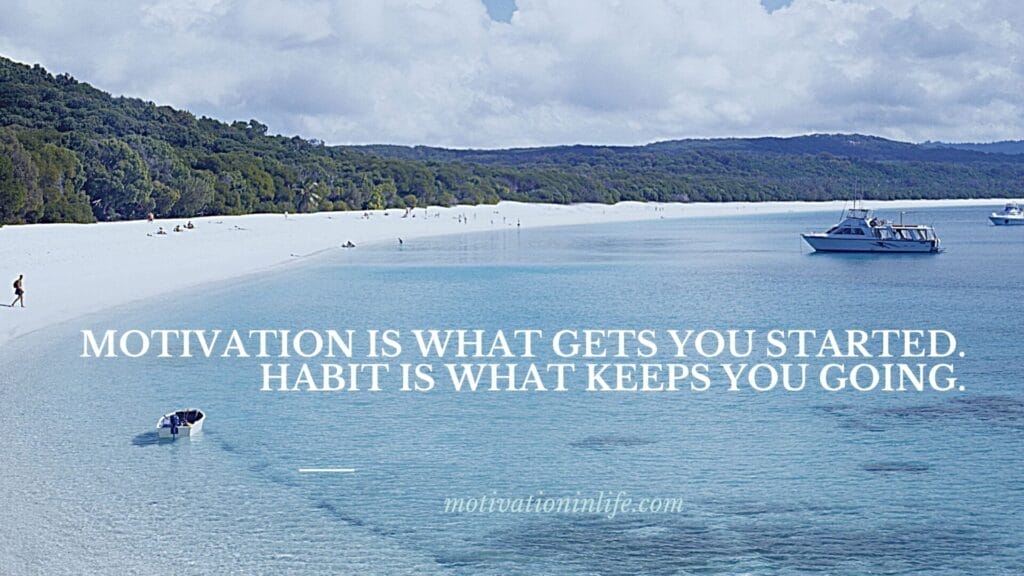
Small Habits That Will Change Your Midlife
It is a popular saying that Rome was not built in a day. Similarly, when it comes to trying and understanding how to develop good daily habits in life, it is important to realize that any effort takes time.
You won’t see the results of your hard work for a long time, so you must give yourself time and be patient.
The small steps you take daily will make the most significant difference in your life and help you achieve the goals you set for yourself.
Here are 10 Positive habits that you can start with:
- Get up at the same time every day
- Eat healthy meals daily
- Exercise daily
- Write down your ideas daily
- Become More mindful
- Follow the 80/20 Pareto Principle
- Learn to focus on a single task at one time.
- Commit to Social detox daily
- Commit to Self-care daily
- Learn to save and invest well
- At the end of the day contemplate how you spent your day.
All of these tasks should take at most 15 or 30 minutes per day to do. Even five minutes per day on some of them will yield long-term results and reduce stress.
You’ll soon realize that by exercising these personal habits, you’ll feel happier and also like the person you’re growing into. Every day you will be experimenting or trying something new And this is how you build your ideal ‘you.’
Isn’t it time you got started if a simple shift and little things can accomplish so much?
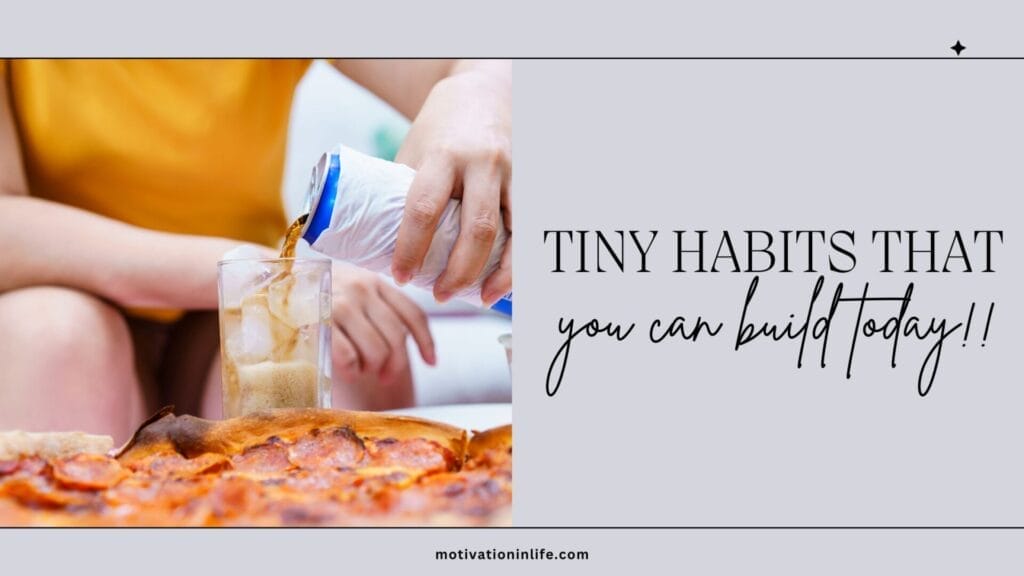
How Do You Create A Small Habit Successfully?
Most attempts to create new habits fail simply because you try to take a little more than you can manage. Instead, you should approach your life in a new way, by employing tiny habits.
Small habits can be a powerful tool to help you achieve your goals. They can be an easy way to make changes in your life, and they can be a great way to get organized.
8 Tips For Creating Small Habits Successfully
- Don’t expect to transform everything in a single day. Begin with a single habit and work your way up.
- Make a firm commitment. Not all habits are the same and some take longer to get ingrained in your brain than others. But one thing is certain. The longer you do the same thing every day the more successful you will be in developing that habit. Decide that you will give this new habit at least a month to get it off to a good start.
- Connect the habit with something that is already working. If you already have a successful habit, consider what other item or habit you can connect to. For example, you may already be cleaning your teeth twice a day. How difficult is it to incorporate flossing into that routine?
- Do not overdo things. You fail to stick to building a habit because you tend to do more than is required. And when you do not get the desired result, you get disappointed and give up. So start small, as research has shown that you have a higher chance of success while working on small habits one at a time.
- Have a strategy in place in case you are not able to execute your original plan. Knowing that things will go wrong from the outset prepares you to deal with them when they do. Is it pouring today, so you can’t jog? That’s fine; have a completely different workout planned as a backup that does not require you to go out.
- Befriend someone. Using your network is the greatest way to stay on track, especially while developing habits. Use an accountability buddy or use social media to keep you accountable.
- Give yourself a treat. Celebrate each small accomplishment with something you want. That will motivate you to keep trying when you’re feeling discouraged.
- Rebrand yourself. Embrace your new self. The behaviors you’re developing will shape who you are — presumably for the better. Enjoy your new identity.
By following these simple steps, you will not only succeed in implementing little habits into your life, but you will also experience some great growth and development as a person over time. That’s thrilling, especially given how little you had to do to get there.
You can read Tiny Habits: The Small Changes That Change Everything by author BJ Fogg where he talks about how to implement small life changes that make a huge impact on your life.
How A Habit-Building Practice Can Change Your Life in Dramatic Ways IN Midlife
A habit-building practice can change your life in dramatic ways. The key is to make sure that you are doing the right things at the right time so that your habits become automatic.
That’s why it’s important to have a
- morning routine,
- a daily routine,
- and an evening routine.
You should also have monthly routines and yearly routines. This is how you will be able to get the most out of your life by turning your habits into automatic routines.
How to develop Positive Habits- Key takeaways
Developing positive habits in your life after 40 can be incredibly beneficial for your health, happiness, and overall well-being. It will add an element of balance to your life.
By incorporating just a few of the habits listed above into your everyday routine, you can start to see a difference in your life. So what are you waiting for? Start building those positive habits today!
By implementing some or all of the good habits listed in this post, you can set yourself up for success. Remember to be patient and take things one step at a time.
Start with one habit and work on building it into a routine. Once you have mastered that habit, move on to the next.
Before you know it, you will have formed several positive habits that will improve your life in many ways. Let’s get started!!
Recommended Reads For Building Positive Habits
- The Power Of Habit By Charles Duhigg (Amazon.com | Amazon.in)
- Better Than Before: By Gretchen Rubin (Amazon.com | Amazon.in)
IF YOU ENJOYED READING THIS POST, PLEASE PIN ONE OF THESE IMAGES BELOW!
I will be grateful for your kind gesture. Thank you!

